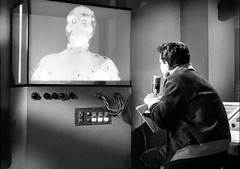We don’t need no official scheme of work for Computing
Good riddance to levels in ICT and Computing
 Who’s afraid of life without Levels? Quite a few people if the number of schemes of work and assessment grids being developed that incorporate levels are anything to go by. Working without levels is clearly very hard: it is almost impossible to think, much less talk, about pupils’ progress without mentioning levels at some stage.
Who’s afraid of life without Levels? Quite a few people if the number of schemes of work and assessment grids being developed that incorporate levels are anything to go by. Working without levels is clearly very hard: it is almost impossible to think, much less talk, about pupils’ progress without mentioning levels at some stage.
Yet this is precisely what the government expects.
9 Challenges of Project-Based Learning
O is for … Old Technology
 My beloved netbook is in a sorry state. It has been languishing for quite a while, becoming more and more depressed as it realised it could not compete with my iPad in terms of cool-ness. In the end, it was too lethargic to fire up at all, and attempts to run it direct from the mains were met with a cold snub.
My beloved netbook is in a sorry state. It has been languishing for quite a while, becoming more and more depressed as it realised it could not compete with my iPad in terms of cool-ness. In the end, it was too lethargic to fire up at all, and attempts to run it direct from the mains were met with a cold snub.
Well, I bought it a new battery, and a new mains charger. I thought it would be pleased, and to an extent, it was. It actually works now, which is a novelty. However, depression or resentment runs deep, and it refuses to work for any longer than two hours on a full charge, instead of its original seven or eight.
What to do?
N is for … New Technology: 5 Reasons You Should Buy It
 I suffer from an unfortunate form of doublethink. In my personal life, I tend not to be an early early adopter. That’s because I rarely have an urgent need for whatever it is the new technology has to offer. However, when I was head of department in a school, and then when I ran a team of advisors and technical support staff in a local authority, I was very keen to spend money on brand new stuff.
I suffer from an unfortunate form of doublethink. In my personal life, I tend not to be an early early adopter. That’s because I rarely have an urgent need for whatever it is the new technology has to offer. However, when I was head of department in a school, and then when I ran a team of advisors and technical support staff in a local authority, I was very keen to spend money on brand new stuff.
Why?
What is good practice in ICT and Computing?
Videos on aspects of Computing and ICT
I thought you might be interested in two new sets of video resources which are, and are becoming, available. The big problem with video in general, in my opinion, is that it’s hard to find the time to sit down and watch something for any length of time because you can’t do much else while you’re doing so. And by “any length of time” I mean anything over about 5 minutes.
So it’s good that there are some 3 minute videos now and some micro-videos coming on stream.
Evaluating a school’s computing and ICT
The guidance provided by Ofsted on what constitutes a grade of “Outstanding” in subjects is currently under review. This is a good time for them to consider a minimalist approach: what two or three factors should be instrumental in coming to a judgement? In my opinion, the more tick-boxes you have, the less useful the whole exercise becomes. I wonder: are there a few key things which determine whether a school’s offering in Computing and ICT is good or not, and which, if tweaked, could transform a low grade into a higher one?
I’m always interested in such things, and that interest was reignited today when I read an article I’d written in 2005. Apart from the documentation referred to, I believe it is still accurate, and pertinent – and could be applied to the inspection of individual subject areas like Computing and ICT as to a whole school or Local Authority.
Anyway, see what you think.
Why Michael Marland is relevant for educational technology teaching
I hadn’t realised, until I read Geoff Barton’s post (Remembering Michael Marland) this morning, that it is five years since Michael Marland died. Mr Barton had the astounding good fortune to know Michael Marland. I didn’t, but I did meet him and chat with him once, which left me with a warm glow that has never dissipated. It was one of the few occasions that I have met one of my heroes and not been bitterly disappointed.
At the time of Marland’s death, I wrote a small tribute to him, which I have reproduced here. His ideas were and are relevant to teachers who use technology in their classroom, as I hope I’ve explained.
7 Ways to make IT real: #5 Be realistic
One sure-fire way to turn pupils off computing and ICT is to set tasks that are either unrealistic in themselves, or contain unrealistic elements.
As an example of the former, I once came across an activity in which
What new teachers need to know -- Personal ICT Skills
This article was originally published on 7th March 2006. Surprisingly perhaps, much of it is still relevant today, given its focus on the importance of having an understanding of computer programming concepts and other aspects of computing.
Making assumptions is a dangerous game! It's commonly assumed that new teachers will automatically know all about information technology because they are young (which is in itself an assumption: what about mature students, housewives returning to work, retired bankers looking for a new challenge, and so on?).
7 Criteria for evaluating a computing scheme of work
 Now that it’s certain that here in England we will have a computing curriculum to follow in September 2014, many people are going to be writing schemes of work. Whether you are a producer or a consumer in this regard, I think you will find the following evaluation criteria useful.
Now that it’s certain that here in England we will have a computing curriculum to follow in September 2014, many people are going to be writing schemes of work. Whether you are a producer or a consumer in this regard, I think you will find the following evaluation criteria useful.Computing and ICT misinformation
 I am continually astonished by people’s misconceptions or misinformation about education in general, and ICT in particular. To be more accurate, I am often shocked, but no longer surprised, at how poorly education tends to be reported on in the press – at least in my experience when it concerns stuff I know about.
I am continually astonished by people’s misconceptions or misinformation about education in general, and ICT in particular. To be more accurate, I am often shocked, but no longer surprised, at how poorly education tends to be reported on in the press – at least in my experience when it concerns stuff I know about.
Now, I understand this when it comes to a subject like science. I used to say to Elaine, over breakfast, things like:
Criticism and self-criticism: some thoughts for ICT teachers and leaders
 I was looking in the archives this morning, to see what I wrote about on this date in the past. By some strange twist, my articles on 4th July in both 2010 and 2011 were about criticism. Not criticism aimed at anyone or anything in particular, but in terms of general principles.
I was looking in the archives this morning, to see what I wrote about on this date in the past. By some strange twist, my articles on 4th July in both 2010 and 2011 were about criticism. Not criticism aimed at anyone or anything in particular, but in terms of general principles.My biggest mistake as an ICT Co-ordinator
Setting: an interview room.
Chair of Governors: So, Mr Freedman, do you have any questions you would like to ask US?
Terry Freedman: Yes. What are YOUR criteria of a successful ICT Co-ordinator?
Headteacher: I want to see teachers banging on the doors of the computer labs demanding to be let in.
4 ways to make your educational technology facilities more inviting
 How do you ensure that the ICT facilities at your school are attractive enough to be used by pupils and staff? Even if your school has a Bring Your Own Technology (BYOT) scheme or a tablet-centred 1:1 scheme in place, you will want to ensure that the school’s own stuff is being used as fully and as effectively as possible. What can you, the ICT Co-ordinator/e-learning co-ordinator/senior leader in charge of ICT in the curriculum, do to help make that happen? Here are some suggestions.
How do you ensure that the ICT facilities at your school are attractive enough to be used by pupils and staff? Even if your school has a Bring Your Own Technology (BYOT) scheme or a tablet-centred 1:1 scheme in place, you will want to ensure that the school’s own stuff is being used as fully and as effectively as possible. What can you, the ICT Co-ordinator/e-learning co-ordinator/senior leader in charge of ICT in the curriculum, do to help make that happen? Here are some suggestions.A matter of trust: 7 ways of finding the right ICT supplier for you
Mullah Nasrudin was in a village he was visiting for the first time. He rushed into a shop, and demanded of the shopkeeper:
“Have you ever seen me before?”
“No!” answered the owner.
“Well then,” asked Nasrudun. “How do you know it’s me then?”
You might think that an ancient Persian folk hero would have little to say a 21st century citizen, but I think you’d be wrong.
L is for lesson observation
Two effects of new technology
 Here are a couple of interesting cartoon strips about the (possible) effects of new technology. Yesterday’s one is more about unintended consequences, while today’s is really about how apparently intelligent software and monitoring systems might be fooled.
Here are a couple of interesting cartoon strips about the (possible) effects of new technology. Yesterday’s one is more about unintended consequences, while today’s is really about how apparently intelligent software and monitoring systems might be fooled.